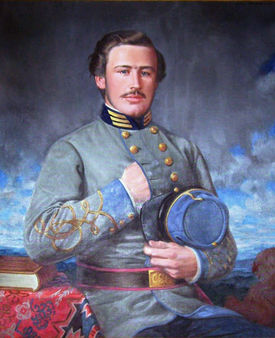John Henley: Difference between revisions
No edit summary |
No edit summary |
||
| (8 intermediate revisions by the same user not shown) | |||
| Line 1: | Line 1: | ||
'''John | [[File:John Henley.jpg|right|thumb|275px|John Henley]] | ||
'''John Charles Henley Sr''' (born [[September 29]], [[1842]] in Montgomery; died [[May 15]], [[1909]] in [[Birmingham]]) was a real estate investor, merchant and banker who came to be considered one of the founding fathers of the city. He and his employer and father-in-law [[Charles Linn]] were among the earlier business operators in the city. | |||
Henley | Henley was the son of John Joseph and Narcissa Molton Henley of Montgomery. He was raised in that city and attended its public schools, entering the world of business as a bookkeeper. At the start of the [[Civil War]] he enlisted in Hilliard's Legion at Mobile, which was enrolled as the 59th Alabama Regiment. Henley was commissioned a captain of the regiment and spent the duration of the war in the field, including two years attached to Lee's Army of Northern Virginia. He was wounded at Drury's Bluff on the James River, but survived and returned to Montgomery after the surrender. | ||
Henley moved to Birmingham was among the bachelors attending [[Charles Linn]]'s "[[Calico Ball]]" in [[1873]]. He was involved in real estate and mercantile businesses until [[1878]], when married Linn's daughter, [[Annie Henley|Annie Linn Matthews]] and took a job as a bookkeeper for his father-in-law's [[National Bank of Birmingham]]. They had three sons, [[Walter Henley|Walter]], [[John Henley, Jr|John, Jr]], and [[Courtney Henley|Courtney]]. | |||
Henley was eventually promoted to the position of cashier. He was one of the organizers of the [[First National Bank]], and, upon the consolidation of the National Bank with [[City National Bank]] to form the [[AmSouth Bank|First National Bank of Birmingham]], he was chosen vice-president of that institution. He was given credit for wise decision-making that allowed the bank to prosper through the years. | |||
Henley was also president of the [[Birmingham Insurance Company]], founded in [[1884]]. | |||
==References== | ==References== | ||
* {{Dubose-1887}} | |||
* {{Cruikshank-1920}} | * {{Cruikshank-1920}} | ||
{{DEFAULTSORT: Henley, John}} | {{DEFAULTSORT: Henley, John}} | ||
[[Category:1842 births]] | [[Category:1842 births]] | ||
[[Category: | [[Category:1909 deaths]] | ||
[[Category:Confederate veterans]] | |||
[[Category:Bankers]] | [[Category:Bankers]] | ||
[[Category:Insurance executives]] | |||
Latest revision as of 20:03, 21 January 2019
John Charles Henley Sr (born September 29, 1842 in Montgomery; died May 15, 1909 in Birmingham) was a real estate investor, merchant and banker who came to be considered one of the founding fathers of the city. He and his employer and father-in-law Charles Linn were among the earlier business operators in the city.
Henley was the son of John Joseph and Narcissa Molton Henley of Montgomery. He was raised in that city and attended its public schools, entering the world of business as a bookkeeper. At the start of the Civil War he enlisted in Hilliard's Legion at Mobile, which was enrolled as the 59th Alabama Regiment. Henley was commissioned a captain of the regiment and spent the duration of the war in the field, including two years attached to Lee's Army of Northern Virginia. He was wounded at Drury's Bluff on the James River, but survived and returned to Montgomery after the surrender.
Henley moved to Birmingham was among the bachelors attending Charles Linn's "Calico Ball" in 1873. He was involved in real estate and mercantile businesses until 1878, when married Linn's daughter, Annie Linn Matthews and took a job as a bookkeeper for his father-in-law's National Bank of Birmingham. They had three sons, Walter, John, Jr, and Courtney.
Henley was eventually promoted to the position of cashier. He was one of the organizers of the First National Bank, and, upon the consolidation of the National Bank with City National Bank to form the First National Bank of Birmingham, he was chosen vice-president of that institution. He was given credit for wise decision-making that allowed the bank to prosper through the years.
Henley was also president of the Birmingham Insurance Company, founded in 1884.
References
- Dubose, John Witherspoon (1887) Jefferson County and Birmingham, Alabama: Historical and Biographical Birmingham: Teeple & Smith, Publishers; Caldwell Printing Works.
- Cruikshank, George H. (1920) History of Birmingham and Its Environs: A Narrative Account of Their Historical Progress, Their People, and Their Principal Interests 2 volumes. Chicago, Illinois: Lewis Publishing Company. - via Birmingham Public Library Digital Collections
